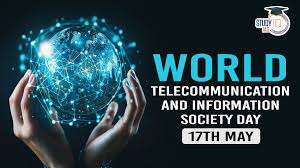New Delhi, May 17, 2025 — As the world observes World Telecommunication and Information Society Day 2025 today, global leaders, industry experts, and policymakers are emphasizing the vital role of telecommunications and information and communication technologies (ICT) in fostering sustainable development and social inclusion. This year’s theme, “Bridging the Digital Divide for a Sustainable Future,” highlights the urgent need to ensure equitable access to digital resources and connectivity worldwide.
Since its establishment by the International Telecommunication Union (ITU) in 1969, World Telecommunication and Information Society Day (WTISD) has served as an important platform to raise awareness about the transformative power of ICT. Over the decades, telecommunications have evolved from basic voice communication to complex digital ecosystems driving economic growth, innovation, and social progress.
The Growing Importance of Digital Inclusion
In 2025, approximately 4.9 billion people around the globe have internet access, yet nearly 2.5 billion remain offline, disproportionately affecting rural, low-income, and marginalized communities. The digital divide—the gap between those with access to modern information and communication technologies and those without—remains a critical barrier to inclusive development.
Experts underline that bridging this divide is not merely a matter of technology but a multifaceted challenge involving infrastructure development, affordable services, digital literacy, and policy frameworks. “Digital inclusion is fundamental for empowering individuals, enhancing education, improving healthcare delivery, and boosting economic opportunities,” said Dr. Meera Singh, a leading ICT policy analyst.
Telecommunication Innovations Driving Change
The telecommunications sector continues to spearhead innovations that promise to narrow the gap. The global rollout of 5G networks is accelerating, offering faster speeds and greater connectivity to underserved regions. Additionally, emerging technologies such as satellite internet, Internet of Things (IoT), and artificial intelligence (AI) are expanding the reach and capabilities of telecommunication networks.
Governments worldwide are investing heavily in digital infrastructure projects. India, for example, has launched initiatives under the Digital India campaign to enhance broadband penetration in rural areas, promote digital literacy, and encourage e-governance services. Public-private partnerships are increasingly seen as critical to scaling these efforts.
ICT for Sustainable Development Goals
World Telecommunication and Information Society Day 2025 also reaffirms ICT’s pivotal role in achieving the United Nations Sustainable Development Goals (SDGs). Reliable connectivity enables progress in quality education (SDG 4), gender equality (SDG 5), decent work and economic growth (SDG 8), and reduced inequalities (SDG 10).
“The integration of ICT solutions into development agendas amplifies the impact of traditional programs,” stated Ravi Kumar, Director of the National Institute of Telecommunications. “From telemedicine to smart agriculture, digital technologies are transforming lives.”
Challenges Ahead and the Way Forward
Despite advances, several challenges persist, including cybersecurity threats, digital privacy concerns, and the risk of technological exclusion for vulnerable populations. Policymakers must balance innovation with regulation, ensuring that technology benefits all segments of society.
International cooperation remains paramount. Collaborative efforts through organizations like the ITU facilitate knowledge sharing, standards development, and coordinated policies essential for a globally connected future.
Conclusion
As the world marks World Telecommunication and Information Society Day 2025, the message is clear: bridging the digital divide is indispensable for an inclusive, sustainable future. By harnessing telecommunication advancements and prioritizing digital inclusion, societies can unlock new opportunities, foster innovation, and build resilience in an increasingly interconnected world.
Citizens, governments, and industries are urged to commit to closing connectivity gaps, enhancing digital skills, and ensuring that the information society leaves no one behind.



